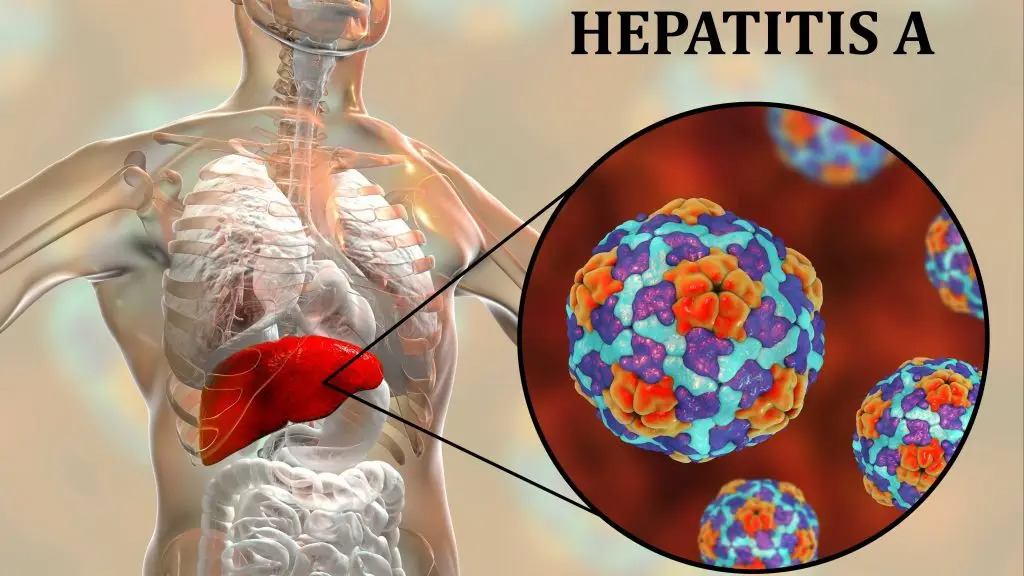Hepatitis A is a contagious liver disease that is a result of infection with the hepatitis A virus. The disease can range in severity from a mild illness lasting a few weeks to a severe illness causing liver failure. Most people infected with the virus develop symptoms within 2-6 weeks of exposure. Symptoms usually last less than 2 months but can last up to 6 months. Hepatitis A can be more serious and potentially life threatening for older people and people who already have liver disease such as chronic hepatitis B or C. Unlike hepatitis B and C, hepatitis A does not turn into a chronic infection. A vaccine is available for those who have been exposed to Hepatitis A virus or are prone to complications due to hepatitis A.
Signs and symptoms:
The illness varies depending on the type of hepatitis, and may be mild or very severe. Symptoms will also depend on whether the illness is acute or chronic. Common symptoms include:
- A high temperature (fever).
- A yellow tinge to the skin or eyes (jaundice).
- Feeling tired.
- Muscle or joint aches and pains.
- Tummy (abdominal pain).
- A poor appetite.
- Feeling sick (nausea).
- Darker-coloured urine and pale-coloured stools.
- Headache.
When to see a doctor?
Make an appointment with your doctor if you have signs or symptoms of hepatitis A.
Getting a hepatitis A vaccine or an injection of immunoglobulin (an antibody) within two weeks of exposure to hepatitis A may protect you from infection. Ask your doctor or your local health department about receiving the hepatitis A vaccine if:
- Someone close to you, such as a roommate or caregiver, is diagnosed with hepatitis A
- You have traveled out of the country recently or to areas with poor sanitation
- A restaurant where you recently ate reports a hepatitis A outbreak
ہیپاٹائٹس اے
ہیپاٹائٹس اے ایک جگر کی بیماری ہے جو ہیپاٹائٹس اے وائرس کے انفیکشن کا نتیجہ ہے۔ اس بیماری کی شدت ایک ہلکی بیماری سے لے کر کئی ہفتوں تک جاری رہنے والی شدید بیماری تک ہوسکتی ہے جس کی وجہ سے جگر فیل ہو جاتا ہے۔ وائرس سے متاثرہ زیادہ تر لوگ دو سے چھ ہفتوں کے اندر علامات ظاہر کرلیتے ہیں۔ علامات عام طور پر 2 ماہ سے کم رہتی ہیں لیکن 6 ماہ سے زیادہ عرصے تک بھی رہ سکتی ہیں۔ ہیپاٹائٹس اے زیادہ شدید اور ممکنہ طور پر عمر رسیدہ لوگوں اور ان لوگوں کے لیے جان لیوا ثابت ہو سکتا ہے جو پہلے سے ہی جگر کے عارضے میں مبتلا ہیں۔ ہیپاٹائٹس بی یا سی کے برعکس ہیپاٹائٹس اے دائمی انفیکشن میں تبدیل نہیں ہوتا۔ ایک ویکسین ان لوگوں کے لیے دستیاب ہے جو ہیپاٹائٹس اے وائرس سے متاثر ہوئے ہیں یا ہیپاٹائٹس اے کی وجہ سے پیچیدگیوں کا شکار ہو سکتے ہیں۔
علامات اور نشانات
علامات کا انحصار اس بات پر بھی ہوتا ہے کہ بیماری ہلکی ہے یا شدید ہے۔ عام علامات میں شامل ہیں:
-جلد یا آنکھوں میں پیلاہٹ
- تھکاوٹ، سر درد اور جسم میں درد۔
- بھوک نہ لگنا
متلی یا قے محسوس ہونا
- زرد رنگ کا پیشاب آنا
- بہت تیز بخار
ڈاکٹر سےکب رجوع کریں
اگر آپ کو ہیپاٹائٹس اے کی علامات یا نشانات ہوں تو فوری اپنے ڈاکٹر سے رجوع کریں۔ اگر وائرس لگ گیا ہے تو دو ہفتوں کے اندر اندر ہیپاٹائٹس اے ویکسین یا امیونوگلوبلین (ایک اینٹی باڈی) لگانے سے آپ کو انفیکشن سے بچایا جا سکتا ہے۔ اپنے ڈاکٹر یا اپنے مقامی محکمہ صحت سے ہیپاٹائٹس اے کی ویکسین حاصل کرنے کے بارے میں پوچھیں اگر:
- آپ نے حال ہی میں ملک سے باہر سفر کیا ہے یا صفائی ستھرائی کی کمی والے علاقوں میں
- ایسا ریسٹورنٹ جہاں آپ نے حال ہی میں کھایا تھا وہاں ہیپاٹائٹس اے کی وبا کی اطلاع آئی ہو۔
- آپ کے قریبی ساتھی یا گھر پر کسی میں ہیپاٹائٹس اے کی تشخیص ہوئی ہو۔
Doctors to consult (Gastroenterologist):
Dr. Muhammad Waseem, Prof. Dr. Qurratul Ain Hyder, Dr. Zulqarnain Khan Haider
Note: Click the Doctor's name to make an appointment.
Reference:
https://patient.info/digestive-health/hepatitis/hepatitis-a
https://www.mayoclinic.org/diseases-conditions/hepatitis-a/symptoms-causes/syc-20367007

